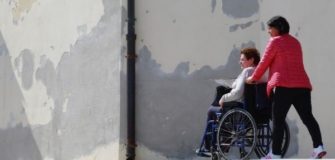, he couldn’t always physically help out, but as he got older, he started to take on a lot more responsibility to help out his parents who look after David full time. For example, Michael now speaks on behalf of David with medical professionals and deals with any related paperwork.
Besides helping with David’s daily routines, Michael leads a busy life working as an Associate Marketing Director for National Australia Bank, while also running a small digital consulting business outside of business hours.
Things have become particularly tricky since COVID-19 descended. With a series of heavy restrictions in place, Michael and the family have had to take a few additional steps to look after David’s both physical and mental health. This includes things like preparing extra gloves and masks when carers come in and need to spend more time with David as he has found it difficult adapting to socialising online. One of the biggest setbacks has been the reduction in David’s time in day services because of prevention measures they’ve had to minimise his social exposure which has taken a toll on David as well as increasing the demands on his family.
The title of ‘carer’ is a role Michael feels incredibly proud to have. He added, “Being an unpaid carer means I’m helping someone I absolutely love and I find it important to have a recognised name for what we as carers do. I grew up as a young unpaid carer while going to school, without even realising it until years later. That only changed when I met someone else who was in the same position as me.”
Michael also believes that the impact on young, unpaid carers isn’t always understood.
Michael said, “A lot of carers tend to be more mature than people at their age because of the responsibilities that fall on them. They essentially have to grow up quicker than a normal child and are forced to face difficult things that others wouldn’t have to.”
“Besides, I cannot stress enough the importance of having a support network! Knowing the role I have been playing was shared by over 750,000 other young people and many more adults in Victoria alone, was a much-needed source of relief – it removes the isolation that caring can bring.
“Knowing you’re not the only one and having people you can speak to who you know will understand, makes an immeasurable impact.”





























